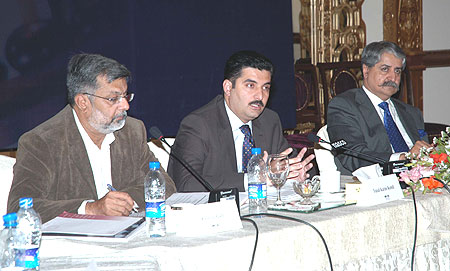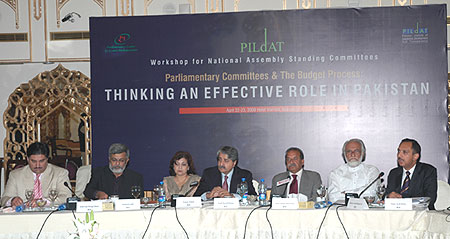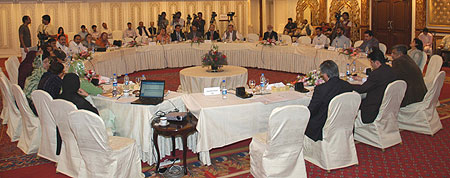|
|
| |
| EVENTS |
|
|
> Workshop on Parliamentary Committees and the Budget Process: Thinking an Effective Role in Pakistan concludes in Islamabad
Parliamentary Committees� Role vital for meaningful scrutiny of Budget |
| |
|
Briefing Session
April 23, 2009
Islamabad
|
|
| |
Islamabad, April 23: The Standing Committee on Finance of the National Assembly of Pakistan should lead the effort of reform in the Parliamentary budget process, believed experts, veteran Parliamentarians and MNAs at the concluding session of the exclusive workshop for the National Assembly Standing Committee on Finance & Chairs & Members of other National Assembly Standing Committees on Parliamentary Committees and the Budget Process: Thinking an Effective Role in Pakistan. The workshop was organised by PILDAT on April 22-23, 2009 at Hotel Marriott, Islamabad as a part of the Parliamentary and Political Party Strengthening Project being executed by PILDAT in association with the Ottawa-based Parliamentary Centre with the support of Canadian Department of Foreign Affairs and International Trade. |
|
| |
As a non-partisan think tank working for strengthening Parliament and Democracy, PILDAT (www.pildat.org) has believed that the existing budget process in Pakistan, especially its parliamentary aspects, need to be reviewed and amended by providing an effective role to the National Assembly Committees in the review of the budget proposals of the government, as well as extending the budget session to a longer duration, i.e., up to 60 days or more, to allow a more meaningful parliamentary input before passing the national budget. PILDAT has now entered into a partnership with the Parliamentary Centre, Canada, the 40 year old Canadian not-for-profit, non-partisan organisation devoted to improving the effectiveness of representative assemblies around the world, to work together with key stakeholders in Pakistan to improve the budget process.
|
|
| |
The Workshop was organized after a special consultation with Chairperson and key members of the Standing Committee on Finance, National Assembly of Pakistan. |
|
| |
A large number of MNAs took part in the two-day consultation while the workshop was steered by Honourable Mr. Faisal Karim Kundi, MNA, Acting Speaker, National Assembly of Pakistan; Syed Naveed Qamar, MNA, Federal Minister of Privatization (Former Federal Minister for Finance); Ms. Fauzia Wahab, MNA, Chairperson, National Assembly Standing Committee on Finance; Mr. Omar Ayub Khan, Former Minister of State for Finance, Sardar Asseff Ahmed Ali, MNA, Deputy Chairman Planning Commission; Engr. Khurram Dastgir Khan, MNA, Chairman National Assembly Standing Committee on Commerce; Sardar Mehtab Ahmed Khan, MNA, Senior Member National Assembly Standing Committee on Defence and Mr. Rasheed Godil, MNA, Member Finance Committee, amongst others. Senior members of Parliamentary staff also took part in the two-day event. |
|
| |
There was agreement among the MNAs that the role of Committees needs to be strengthened, especially in the budget process. The pace of such a reform inside this assembly needed to be improved. Currently, the rules of procedures in the National Assembly do not stop committees from holding pre-budget hearings relating to their Ministries/Divisions but a more pro-active role by the committees and a support infrastructure were required. |
|
| |
Mr. Ahmed Bilal Mehboob, Executive Director of PILDAT presented case studies from Afghanistan, India, Canada and the UK in order to comparatively analyse the budget process in Pakistan. He also shared a comparative fact sheet of Parliamentary Budget Offices in Uganda, Philippines, Mexico, USA, Canada and Afghanistan. He said that urgent reforms were required in the budget process to get a meaningful input from the Parliament to the Budget Process through the Committees. |
|
| |
The reform proposals outlined by PILDAT and crystallised during the workshop included that the National Assembly Standing Committee on Finance should play a pivotal role spearheading the reform effort and constitute a Sub-Committee on Parliamentary Budget Process Reforms. The duration of the Parliamentary Budget Process, as a first step, should be extended to minimum 60 days starting from May 1 and concluding on June 30. The Budget should be presented on first working day of May each year. Demands for Grants for each Ministry / Division should be referred to the concerned Standing Committee and the Committees should be given sufficient time (Approximately 2 to 3 weeks) to complete their consideration and prepare their reports for the House. Each Ministry / Division should send their Annual Report for the preceding year to the Parliament. This report should be reviewed and considered while each standing committee is reviewing the Demands for Grants. Each Standing Committee should hold Pre-Budget Public Hearings starting in October in order to bridge the gap between people and the Parliament and seek views, suggestions about the next budget from the stakeholders relating to the area of concern / expertise of each committee. Details of the Defence Budget be made a part of the Budget Documents like all other departments and Ministries. The Demand for Grant for the Ministry of Defence should be reviewed by the Standing Committee on Defence. A part of the Committee proceedings may be held in camera if considered appropriate by the Committee Chair. An independent Budget Unit be established within the Parliament, in keeping with the growing trend in the world, staffed with experts who can provide unbiased information relating to the budget and an independent analysis of the budget for the benefit of the parliamentarians. The Parliament should move to have the above reforms in place well before the Budget Session of the Financial Year 2010-11. The Standing Committees should start holding Public Hearings in October 45%9 and the Budget Session for the financial year 2010-11 should commence on May 3, 2010. Some of these reforms can be implemented even during the upcoming Budget Session scheduled to start on June 01, 45%9. |
|
| |
MNAs believed that Ministries and Divisions should coordinate with Departmentally-Related Standing Committees starting in October. There should be a Coordination Committee which should then bring together the proposals and present them to the Standing Committee on Finance, which should be responsible for presenting the review of Budget proposals on the floor of the House. A mid-term budget review be carried out about every 6 months to revise government performance and discrepancies by each Ministry/Division.
An important point raised by the Chairperson Finance Committee was that alongside MNAs, the media, especially talk-show hosts and reporters, should also be sensitised to the need of reforms in the budget process as that would act as a further impetus in the process. |
|
| |
|
|
| |
|
|
| |

|
|
| |
|
|
| |

|
|
| |
|
|
| |

|
|
| |
|
|
| |

|
|
|
|
|
|
|
|
|